 Some years ago I stopped at a local gas station to fill up a low tire. Guess what I encountered at the air hose? Fifty cents for air! What was so special about this air? Was it a special blend of oxygen that would add years to the life of my tires or seal punctures if I accidentally ran over a nail? Wasn’t it the same air I was huffing and puffing as I fumed at the thought of paying fifty cents to put what was free and all around me into my tire?
Some years ago I stopped at a local gas station to fill up a low tire. Guess what I encountered at the air hose? Fifty cents for air! What was so special about this air? Was it a special blend of oxygen that would add years to the life of my tires or seal punctures if I accidentally ran over a nail? Wasn’t it the same air I was huffing and puffing as I fumed at the thought of paying fifty cents to put what was free and all around me into my tire?
I’m giving away my age by reflecting for as long as I can remember air for your tires has always been FREE! Now we all know this “free air” was a “loss leader”. It encouraged customers to stop in and in the process buy the tires, belts, and gasoline the station sold.
But, at the risk of exposing my latent “Pollyanna” complex, I also felt there was a certain genuineness about the offer of free air. I felt that the station owner truly wanted to help me improve my gas mileage and provide a safer trip for me and my family. And in return for this feeling of concern, I would come back and buy the tires, belts, and gas the station sold!
Surely this company’s policy of charging for air had to be introduced by some anti-social bean counter with no contact with his company’s customers. I couldn’t imagine the company’s managers suggested it just so their customers would stop in and COMPLAIN about this expensive air! I felt like I was fuming all alone until…
I picked up a book called Alpha Dogs and read about Chris Zane who owns a bicycle shop in Branford, Connecticut. Zane’s Cycles is the largest Trek dealer and one of the largest independent bicycle dealers in the country. Even better, Zane’s Cycles makes profit margins that would make an investment banker blush!
So what’s Zane’s secret? By offering FREE lifetime service on every bike they sell, by giving away FREE any item that costs less than a dollar AND by understanding that what they really sell is the service (and the experience) that happens to be paired with a bicycle. (Somehow, I doubt that Zane’s Cycles charges to top off the air in their customers’ bicycle tires!)
So, how much are you charging for the “free air” at your company? For example, reflect on your employees. If you view every time you correct an employee as a charge, and every time you compliment an employee as a freebie, how many freebies are you giving away throughout the day? When you add up all the charges and all the freebies “who owes whom” at the end of the day?
When employees receive enough freebies they gradually feel “freer” to share their opinions and freer to make decisions. Conversely, when they feel they’re going to be “charged” every time they open their mouths- it doesn’t take long for your people to “shut down”. (Which of course leads to frustration, resentment and high turnover.) Yep, eventually those small “employee charges” are going to cost you a lot more than the free air you could given your staff!
NOTE: Steve Toburen in Jon-Don’s Strategies for Success seminar states that Public Recognition is the cheapest, (as in FREE!) easiest, fastest and most effective employee motivation tool out there! The crazy thing? Most of us seldom use this FREE technique!
It doesn’t matter whether it’s “free air” or free speech or freedom of choice, each has a corresponding cost and a corresponding benefit. It’s up to you to choose which is greater.
Chuck Violand (more about Chuck)
SFS Instructor
CEO Violand Management Associates

Great piece. I feel that when a vac shop gives me a free belt after I’ve just bought a $300 vacuum, that I’m definitely coming back there for more bags, parts, etc. Service, my next vacuum — how much did that $.49 belt win them?
Of course that was the guy who works there, the owner is too cheap to give anything away . . . makes a big difference who I deal with.
Wondering how to implement this in my business — I try to detail the cost of services and delineate what I gave them free — a free room, a free room of protectant, etc.
So they can look at the invoice and not assume n/c means it didn’t cost anything.
Good point on the “n/c”. Just to be safe why not write out “no charge”? Check out our Residential Moment of Truth Checklist under “QuickFixes” to see ways to create the Cheerleader and they are FREE! (You don’t have to give away anything!)